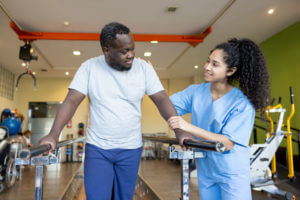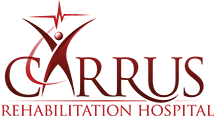
Unforeseen circumstances, such as a traumatic brain injury (TBI), can pose significant challenges, affecting individuals and their loved ones profoundly. TBIs require prompt and precise diagnosis, followed by custom-tailored treatment and rehabilitation strategies.
Let’s discuss the fundamental aspects of these injuries, including their causes, diagnostic procedures, and available treatment options.
What is a Traumatic Brain Injury?
These injuries result from an external force causing brain dysfunction.
This force can be a jolt, bump, or blow to the head. It can also be a penetrating head injury that disturbs normal brain function.
The severity of a TBI can range from mild, commonly known as a concussion, to severe, which can result in prolonged periods of unconsciousness or amnesia after the injury.
Diagnosing TBIs
The path to recovery from a traumatic brain injury begins with an accurate and prompt diagnosis. Healthcare professionals employ a variety of tools and tests to diagnose TBIs.
These include:
Neurological Examinations
Your healthcare provider will conduct a comprehensive evaluation that assesses:
- Thinking
- Motor function
- Sensory function
- Coordination
- Eye movement
- Reflexes
Imaging Tests
Advanced imaging technologies, such as CT scans and MRIs, are crucial for visualizing the extent of the brain injury and guiding treatment plans.
These diagnostic steps are vital in understanding the impact of the injury and crafting a personalized treatment plan that addresses the unique needs of each patient.
Treatment Options
The treatment for TBIs varies significantly based on the severity of the injury.
The best approach includes a holistic and integrated treatment plan that encompasses the physical, emotional, and cognitive aspects of recovery.
Mild TBI Treatments
For milder injuries, rest and over-the-counter pain relievers may suffice to treat symptoms like headaches. Close monitoring is essential to ensure a full recovery.
Medications
Various medications may be prescribed to manage symptoms.
This includes pain medicines, anticonvulsants for seizures, and anti-anxiety medication to address feelings of nervousness and fear.
Rehabilitation
For more severe TBIs, a multifaceted rehabilitation program is often necessary. This can include:
- Physical therapy to regain motor function
- Occupational therapy to assist in everyday tasks
- Speech therapy to improve communication abilities
Here are the benefits of rehabilitation for individuals who have experienced a TBI:
Enhanced Physical Recovery
Rehabilitation offers a key advantage by enhancing physical well-being. Individuals can recover strength, coordination, and flexibility through focused therapies like physical and occupational therapy. This improved physical rehabilitation is vital in reinstating autonomy in daily tasks and enhancing life quality.
Cognitive Improvements
TBIs often affect cognitive functions, including:
- Memory
- Attention
- Problem-solving skills
Cognitive rehabilitation therapies are designed to address these impairments, aiding in the restoration of these vital functions.
By employing specialized exercises and strategies, patients can experience significant improvements in their cognitive abilities.
This contributes to a more successful reintegration into work, school, or social activities.
Emotional and Psychological Support
The impact of a traumatic brain injury (TBI) extends beyond physical and cognitive challenges, encompassing emotional and psychological aspects as well. Rehab programs are not just about physical recovery anymore. They understand the mind and body work together. That is why they often have therapists and counselors on hand to tackle things like depression, anxiety, or even PTSD. It is a much more well-rounded approach that makes people feel better.
Improved Communication Skills
Effective communication can pose a major challenge for those recuperating from a traumatic brain injury (TBI). Speech and language therapy, a vital aspect of rehabilitation, plays a key role in enhancing speech clarity, comprehension, literacy, and non-verbal communication skills.
Improving these faculties not only enhances interactions with others but also cultivates a sense of self-assurance and autonomy.
Social Reintegration
Rehabilitation provides a supportive environment where individuals can interact with peers undergoing similar experiences. This social aspect is invaluable, offering opportunities for:
- Mutual support
- Understanding
- Encouragement
Furthermore, therapy sessions aimed at developing social skills can prepare individuals for a smoother transition back into their communities.
Tailored Traumatic Brain Injury Rehabilitation Programs
The best rehabilitation programs are designed with the understanding that recovery encompasses much more than physical healing.
This plan will include a range of targeted therapies, including:
- Cognitive Rehabilitation: To enhance memory, attention, problem-solving, and cognitive flexibility.
- Speech-Language Pathology Services: Aimed at improving communication skills and addressing swallowing difficulties.
- Physical and Occupational Therapy: These therapies focus on improving motor skills, balance, and coordination and assisting patients in relearning daily activities and tasks.
- Vestibular and Oculomotor Rehabilitation: To address issues related to balance, dizziness, and visual disturbances.
Effective rehabilitation involves at least six hours of therapy per day in post-acute settings.
This intensive approach ensures that every patient has the opportunity to make significant progress in their recovery journey.
Traumatic Brain Injury Rehab Near Me in Sherman, TX
Rehabilitation after a TBI is a journey that requires patience, dedication, and unwavering support. If you need traumatic brain injury rehab near you, look no further than Carrus Health Rehabilitation Hospital. At our facility, we are committed to walking this path with you, offering compassion, expertise, and encouragement every step of the way. We offer both inpatient and outpatient mental health services Our care is highly personalized, and we work with patients to create treatment plans that are evidence-based and highly effective.
If you need closer assistance or have any questions about our services, call our helpful staff today at (903) 870-2600.
We look forward to serving you!

